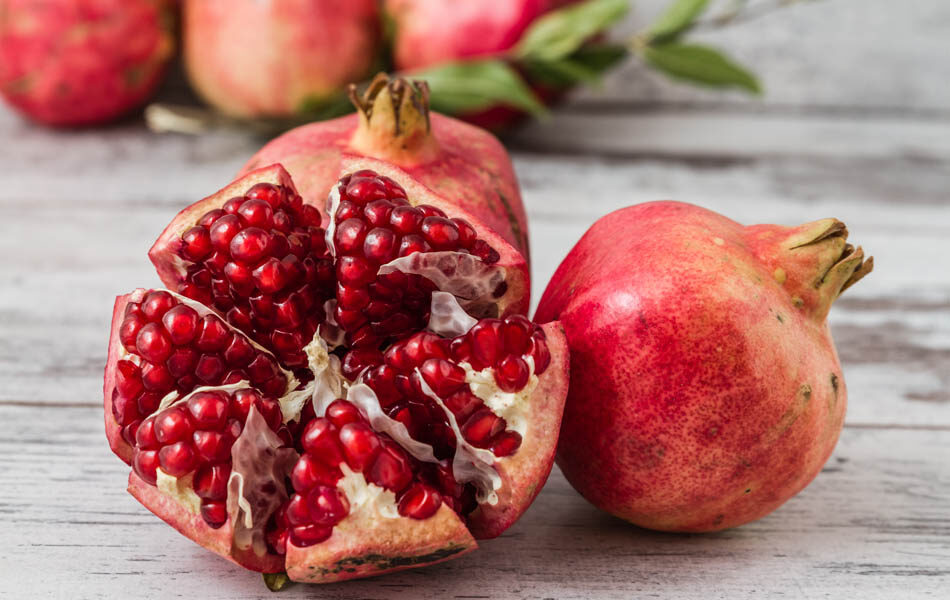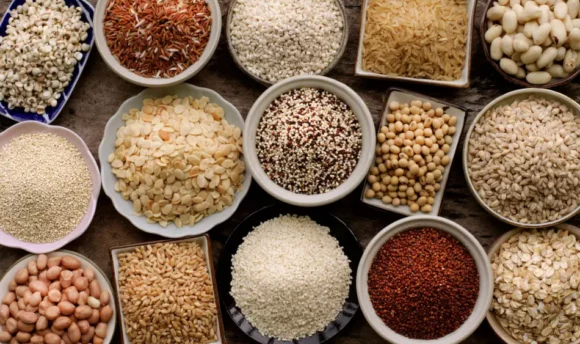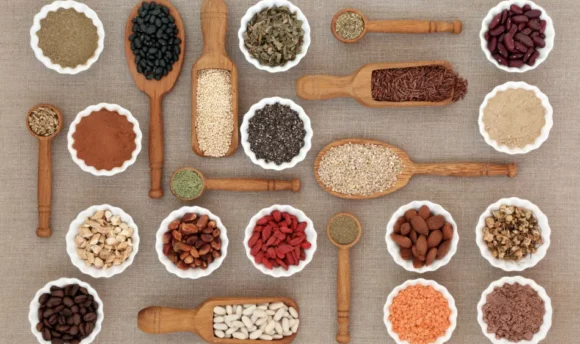Is Pomegranate Healthy? Nutrition Facts and 10 Health Benefits
Pomegranates are a popular fruit around the world many enjoy as juice, a snack, a topping for cereal or yogurt, an addition to a salad, and more. This article will cover the benefits of pomegranates for your health.

Known for their sweet and juicy seeds called arils, pomegranates are a vibrantly pink-colored fruit with many benefits and some side effects to your health.
Let’s talk about the nutritional information of pomegranates, as well as the health benefits you can reap from eating them. Read on!
Is Pomegranate Healthy?
Pomegranate is a healthy fruit that is rich in antioxidants, fiber, vitamins, minerals, and more. In addition, it is low in calories and fat.
10 Health Benefits of Pomegranate
Whether improving cardiovascular health, reducing cancer risk, and more, let’s talk about some potential health benefits of pomegranate.
#1 It is rich in antioxidants
If you drink pomegranate juice or eat pomegranate arils, you are getting many antioxidants, such as vitamin C. Antioxidants are compounds that protect cells in the body from free radicals. Free radicals are harmful but are naturally produced by essential body processes, such as energy metabolism.
Free radicals can contribute to inflammation and oxidative stress in the body. Oxidative stress plays a role in many chronic diseases, such as diabetes.
Therefore, antioxidant properties are helpful in the diet to reduce the harm free radicals can do to cells.
#2 It can reduce constipation and improve digestive health
Pomegranates are rich in dietary fiber, with 4 grams in 100 grams of pomegranate arils. Dietary fiber, also known as roughage, is the part of a plant that the body cannot digest.
Since the body cannot digest fiber, it moves through the body, promoting healthy bowel movements and digestive health. In addition, the fiber softens stool which can reduce constipation but can also reduce diarrhea because fiber absorbs water.
The Mayo Clinic recommends that men and women aged 50 or younger consume 38 grams and 25 grams of fiber daily. On the other hand, men and women aged 51 and older should aim for 30 and 21 grams of dietary fiber daily.
Pomegranate juice is likely lower in fiber because it has been strained. As a result, eating the seeds is preferred to drinking the juice.
#3 It can promote healthy blood sugar levels
Pomegranate seeds have a low glycemic index of 35, which is a measurement those with diabetes rely on to determine how quickly a food will increase blood sugar.
Pomegranate seeds’ low glycemic index is most likely owing to their fiber content.
Furthermore, the fiber in pomegranate seeds aids with blood sugar regulation by slowing the digestion and absorption of sugar from the fruit.
Pair with a protein and healthy fat source for even greater blood sugar management.
#4 It may decrease blood cholesterol levels
While we have already noted that they are high in fiber, pomegranate seeds include soluble fiber, which means that they may be dissolved in water to produce a gel-like substance.
According to the Mayo Clinic, this type of fiber can help lower cholesterol levels by reducing the “bad” cholesterol called low-density lipoproteins, or LDL cholesterol.
Lower cholesterol can improve heart health and decrease your risk of developing chronic heart disease, including high blood pressure, heart attack, and stroke.
#5 It can reduce the risk of cancer
According to the journal Food Chemistry, antioxidants present in foods, such as pomegranates, can have anti-cancer properties. Researchers propose that this relationship may have to do with the oxidative stress that is present in cancer progression.
#6 It may lower blood pressure and improve heart health
Pomegranate contains a significant amount of the essential mineral potassium. According to Harvard Medical School, studies demonstrate that potassium can reduce blood pressure and lower the risk of heart disease.
#7 It supports healthy bones and teeth
Pomegranates are rich in minerals such as phosphorus and calcium. These essential minerals work together with vitamin D to build and maintain strong bones and teeth.
According to the 2020–2025 Dietary Guidelines for Americans, milk or yogurt are excellent sources of vitamin D.
#8 It is rich in electrolytes potassium and magnesium
Pomegranates are rich in potassium and magnesium. According to Today’s Dietitian, electrolytes are essential for fluid balance as they move in and out of the cell during changes in hydration.
Therefore, having a diet rich in electrolytes can help you maintain adequate hydration and fluid status.
#9 It helps to support a healthy immune system
Besides its antioxidant functions, vitamin C in pomegranates also boosts the immune system. A good source of vitamin C in your diet can protect you from pathogens that can get you sick.
#10 It is rich in iron and promotes blood health
Iron is essential for healthy red blood cells. Iron helps red blood cells carry oxygen around the body to cells so they can do work.
3 Side Effects of Pomegranate
Now that we have discussed the potential health benefits of pomegranates, let’s discuss some of the potential side effects and how to avoid these effects. Read on to learn more!
#1 It can cause gastrointestinal upset
Those who are not used to a fiber-rich diet may experience certain unwanted side effects if they suddenly consume high-fiber foods (such as pomegranate seeds). Bloating, gas, and stomach discomfort are some of the symptoms.
To avoid this, gradually increase your fiber consumption at first.
Additionally, pomegranate juice is an excellent starting point because it has less fiber than the seeds.
#2 It contains high amounts of potassium
According to the American Heart Association, consuming too much potassium, like in pomegranate seeds, can be harmful if you have kidney disease.
Many individuals with kidney disorders cannot filter potassium out of the blood, so eating too much of it can cause potassium buildup.
#3 It may lower blood pressure too much
According to the Cleveland Clinic, consuming too much potassium can lower blood pressure.
A blood pressure that is too low is potentially unsafe. Therefore, if you are on a medication such as ACE inhibitors, speak with your physician about potassium-rich foods.
Nutrition Facts of Pomegranates
Now that we have covered the health benefits of pomegranates and how to avoid any potential side effects, let’s dive into the nutritional information.
Nutritional value (per 100g)
| Calories/Nutrient (per 100g) | Amount |
| Calories (kcal) | 83 |
| Sodium (mg) | 3 |
| Net Carbs (g) | 14.7 |
| Fiber (g) | 4 |
| Sugar (g) | 13.7 |
| Fats (Total) | 1.17 |
| Protein (g) | 1.67 |
Source: https://fdc.nal.usda.gov/fdc-app.html#/food-details/169134/nutrients
Low in calories and fats
Pomegranate arils have just 83 calories per 100 grams. Remember that 87 grams of pomegranate arils equal half a cup, so 100 grams equals almost two-thirds of a cup. As a result, 83 calories is an incredibly low quantity of calories for that amount of pomegranate seeds.
However, due to the fiber content, you will still feel full and satisfied from eating the pomegranate. So, it can be a great food to eat when you are trying to lose weight.
Low in protein
100 grams of pomegranate seeds only contain about 1.5 grams of protein. Protein in the diet is essential to support healthy muscle maintenance, repair, and growth in the body.
So, pair your pomegranate seeds with cereal, yogurt, or another high-protein food for the perfect meal or snack!
High in carbohydrates
Pomegranates are high in carbs since they are a fruit that contains natural sugars. Pomegranate seeds contain 14 grams of net carbs, 13.7 grams of which are sugars.
Even though the fruit has natural sugar, it can have the same effect on the body as added sugar. Furthermore, eating more carbs than the body needs for energy might contribute to undesirable weight gain.
For a full snack, stick to 100 grams of pomegranate arils and couple them with other lower-carbohydrate items. If you drink pomegranate juice, limit yourself to half a cup.
Be wary of packaged pomegranate juice because it sometimes comes in significantly larger serving amounts.
Rich in vitamins and minerals
These tiny seeds are jam-packed with vitamins and minerals, including vitamin C, iron, potassium, and folate. They are responsible for many of the health benefits of pomegranates.
Getting all your essential vitamins and minerals is crucial for overall health.
Healthy Pomegranate Recipe
Are you looking for a tasty recipe to reap the health benefits of pomegranates? Here’s a delicious fiber-rich yogurt parfait with pomegranate arils. This recipe is not only high in fiber, but it is also full of dairy, vitamins, minerals, antioxidants, and more.
Ingredients
- 2 cups of Greek yogurt (Note: You can also substitute this for non-dairy yogurt, such as soy yogurt or oat yogurt, based on your preferences.)
- 1/4 cup of pomegranate arils
- 1/4 cup of blueberries
- 1/2 cup of your favorite oat-based granola
- 1 teaspoon of honey, 100% pure maple syrup, or agave nectar (optional)
Directions
- To remove the arils from the pomegranate, score the surface lightly in half or in quarters.
- In a bowl full of water, break apart the halves or quarters of the pomegranate, and the water will help release the seeds.
- Layer the yogurt, fruits, and granola in a cereal bowl.
- Top with your natural sweetener of choice.
- Enjoy!
For more easy recipes, check out the DoFasting app. DoFasting has recipes that have been hand-picked for you by nutrition professionals!

- Useful progress tracker and calendar
- Calorie tracker to track daily caloric intake
- Over 5,000 nutritious recipes
FAQs
Because of the sugar content, limit yourself to no more than half a cup or one cup of pomegranate seeds each day. If you drink pomegranate juice, limit yourself to 4 ounces per day.
Eating pomegranates is good for you because they are high in fiber, antioxidants, vitamins, and minerals, providing many health benefits.
Pomegranates are very low in calories and fat and, therefore, can help with weight loss.
The glycemic index of pomegranate fruit is 35, which is considered low. Therefore, eating pomegranate will not spike your blood glucose levels.
A Word From a Nutritionist
Include pomegranate seeds into your yogurt, parfaits, cereals, and even salads to bulk up the antioxidant and fiber content. Of course, you can pair them with a handful of almonds for more protein and some healthy fats too.
Combining pomegranate with protein and fat will also slow down how quickly your body uses the sugar in the juicy seeds.
Pomegranate juice provides similar health benefits; however, it typically contains less fiber. It is preferable to have the seeds over pomegranate juice. Avoid bottled pomegranate juice, as it is often in larger serving sizes.
Conclusion
Overall, pomegranates are a healthy fruit that many enjoy for their juicy and crunchy seeds, called arils.
Eat pomegranate fruit or drink pomegranate juice to reap the many health benefits, including improving digestive health, lowering the risk of many chronic diseases (including cancer), reducing oxidative stress, and benefiting heart health.
Remember to avoid over-consuming pomegranate seeds since they are so easy to eat! Otherwise, they can be a significant part of a balanced and healthy diet.

















































 Select your language:
Select your language: 








